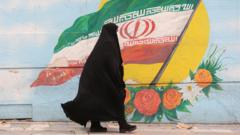Iran's National Security Council has put the controversial "hijab and chastity law" on hold, following intense backlash and criticism from rights activists. President Massoud Pezeshkian labeled the legislation as "ambiguous and in need of reform," indicating a desire to revisit its contentious measures. Initially scheduled to take effect on Friday, the new law aimed to impose stricter penalties on women and girls, including long prison sentences for minor offenses related to modest dress. Human rights organizations have raised alarms about the law, describing it as a means of reinforcing a repressive societal framework.
Iran Delays Implementation of Controversial Hijab Law Amid Growing Opposition

Iran Delays Implementation of Controversial Hijab Law Amid Growing Opposition
Iran's president acknowledges need for reform as protests against strict dress codes escalate.
Pezeshkian's criticism of the current treatment of women during his election campaign resonated deeply with younger, progressive Iranians, many of whom are impatient with the current government's tight grip on personal freedoms. Reactions against the proposed law intensified last week following the arrest of popular singer Parastoo Ahmadi, who was detained after performing a hijabless virtual concert. Her detention ignited public outrage, resulting in her swift release.
Recent tensions surrounding the hijab gained prominence after the death of Mahsa "Zhina" Amini in police custody, which had acted as a catalyst for widespread protests against restrictive clothing laws. In light of emerging dissent, over 300 Iranian writers and activists have openly denounced the hijab law as both "illegitimate and unenforceable," calling on Pezeshkian to stay true to his campaign pledges.
Despite internal pressures from hardline factions urging immediate enforcement, the halt on the hijab law signals the government's apprehension of inciting another wave of mass protests. Observers believe the so-called "hijab crisis" reflects deep societal divisions, as young people increasingly challenge the state's authority.
With Pezeshkian's supporters advocating for reform rather than enforcement, the ongoing debate underscores a complex environment where personal liberty clashes with decades-old institutional policies.
Recent tensions surrounding the hijab gained prominence after the death of Mahsa "Zhina" Amini in police custody, which had acted as a catalyst for widespread protests against restrictive clothing laws. In light of emerging dissent, over 300 Iranian writers and activists have openly denounced the hijab law as both "illegitimate and unenforceable," calling on Pezeshkian to stay true to his campaign pledges.
Despite internal pressures from hardline factions urging immediate enforcement, the halt on the hijab law signals the government's apprehension of inciting another wave of mass protests. Observers believe the so-called "hijab crisis" reflects deep societal divisions, as young people increasingly challenge the state's authority.
With Pezeshkian's supporters advocating for reform rather than enforcement, the ongoing debate underscores a complex environment where personal liberty clashes with decades-old institutional policies.





















